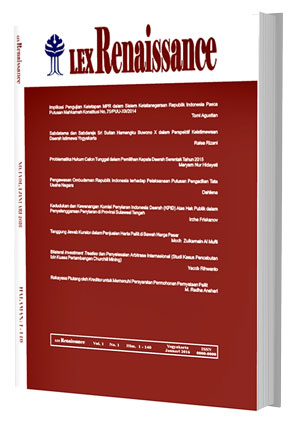Main Article Content
Abstract
The problems in this research include, first, what is the role of the Regional Notary Supervisory Council in imposing sanctions on notaries who do not read deeds? Second, what is the legal consequence for a notary who does not read the deed based on the Decision of Yogyakarta Regional Supervisory Council Number 03/Pt/Mj.PWN DDIY/VI/2016? and third, what is the legal consideration of Yogyakarta Regional Supervisory Council in imposing sanctions on the notary? This study is normative-empirical legal research with a field research type. The results indicate that, first, the role of Notary Supervisory Council is to protect the interests of the community or parties who suffer losses due to legal actions by irresponsible notaries who conduct their duties without referring to the stipulated provisions in both the law and decisions of the notary professional association/organization. Second, the legal consequence for the notary based on the Decision of Yogyakarta Regional Supervisory Council Number 03/Pts/Mj.PWN DIY/VI/2016 is in the form of written notice in which the decision can be used as a reason for a case reporter to sue the concerned notary for a civil compensation. Third, the legal basis for imposing sanctions on the notary, which is the result of investigation stating that the notary has been found guilty, is not a violated formal requirement.
Keywords: Notary; deed; notary supervisory council
Article Details
Authors who publish with this journal agree to the following terms:
a. Authors retain copyright and grant the journal right of first publication with the work simultaneously licensed under a Creative Commons Attribution License that allows others to share the work with an acknowledgement of the work's authorship and initial publication in this journal.
b. Authors are able to enter into separate, additional contractual arrangements for the non-exclusive distribution of the journal's published version of the work (e.g., post it to an institutional repository or publish it in a book), with an acknowledgement of its initial publication in this journal.
c. Authors are permitted and encouraged to post their work online (e.g., in institutional repositories or on their website) prior to and during the submission process, as it can lead to productive exchanges, as well as earlier and greater citation of published work (See The Effect of Open Access).



